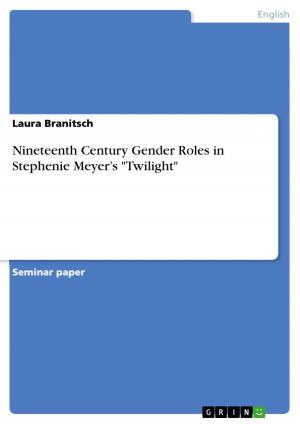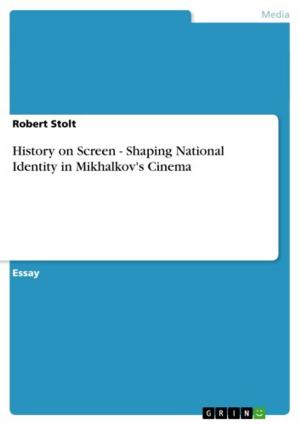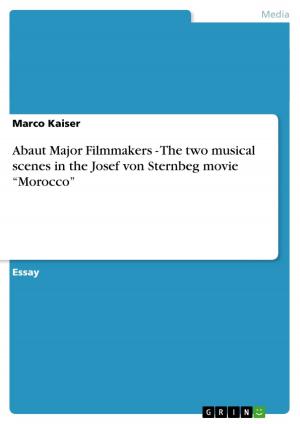The Representation of Ireland in Literature and Media of Hip-hop Artist Jun Tzu. An Analysis of the Song 'The Bridge'
Fiction & Literature, Literary Theory & Criticism, British| Author: | Erik Lutz | ISBN: | 9783668253575 |
| Publisher: | GRIN Publishing | Publication: | July 5, 2016 |
| Imprint: | GRIN Publishing | Language: | English |
| Author: | Erik Lutz |
| ISBN: | 9783668253575 |
| Publisher: | GRIN Publishing |
| Publication: | July 5, 2016 |
| Imprint: | GRIN Publishing |
| Language: | English |
Seminar paper from the year 2016 in the subject English Language and Literature Studies - Literature, grade: 1,3, Catholic University Eichstätt-Ingolstadt, course: Seminar: Representation of Ireland in literature and media from 1900-2015, language: English, abstract: This paper is about the phenomenon of Irish rap in general and about the rapper Jun Tzu in particular. His song The Bridge is being analysed in this work. Questions are: In which way is Irish hiphop music representative and what is it representative for? Irish Rap. This term alone might take the reader a while to fully grasp - and hopefully not much longer to acknowledge. Indeed, the worldwide phenomenon of rap, the musical and vocal element of the hip-hop culture, also has inspired artists on the green isle. As Mitchell states: 'Hip-hop and rap cannot be viewed simply as an expression of African American culture; it has become a vehicle for global youth affiliations and a tool for reworking local identity all over the world.' (Mitchell, 2001, pp. 1f) Out of a number of Irish artists, a rapper called Jun Tzu has gained popularity over the last years reflecting Northern Irish history in his lyrics. Today, Irish rap music is known by a broader audience than ever before. The reason is the online video platform Youtube. Over the last years, it became appealing to a mainstream audience and changed marketing and presentation habits drastically. With over 100 hours of uploaded video material per minute and more than two billion video views per day, the video portal nowadays gives artists a platform to be heard and seen on, that has never before existed. Understandably, this has changed and - through faster distribution - accelerated cultural development when it comes to rap. Artists can react to other artists' works faster than 15 years ago and musicians do not need to publish their music by releasing a CD via a company. The probably most important effect of all: as soon as one owns a computer or even smartphone with internet access, he has a potentially limitless audience for his releases. This gives a special chance especially to Irish rappers whose music would otherwise not be distributed by big music companies in Europe, because too few people would buy the music and the marketing would just not be profitable. A major profiteer of this development is the Irish rapper Jun Tzu, who became known to a broader audience via a BBC documentary he was featured in, that had been distributed via the video platform.
Erik Lutz wuchs in Bayern nahe Ingolstadt auf, wo er das humanistische Reuchlin-Gymnasium besuchte. Während seines Studiums an der katholischen Universität Eichstätt-Ingolstadt entdeckte er seine Faszination für Kommunikation, sprachliche Vorgänge und zwischenmenschliche Beziehungen. Zu seinen Spezialgebieten zählt die Pragmatik.
Seminar paper from the year 2016 in the subject English Language and Literature Studies - Literature, grade: 1,3, Catholic University Eichstätt-Ingolstadt, course: Seminar: Representation of Ireland in literature and media from 1900-2015, language: English, abstract: This paper is about the phenomenon of Irish rap in general and about the rapper Jun Tzu in particular. His song The Bridge is being analysed in this work. Questions are: In which way is Irish hiphop music representative and what is it representative for? Irish Rap. This term alone might take the reader a while to fully grasp - and hopefully not much longer to acknowledge. Indeed, the worldwide phenomenon of rap, the musical and vocal element of the hip-hop culture, also has inspired artists on the green isle. As Mitchell states: 'Hip-hop and rap cannot be viewed simply as an expression of African American culture; it has become a vehicle for global youth affiliations and a tool for reworking local identity all over the world.' (Mitchell, 2001, pp. 1f) Out of a number of Irish artists, a rapper called Jun Tzu has gained popularity over the last years reflecting Northern Irish history in his lyrics. Today, Irish rap music is known by a broader audience than ever before. The reason is the online video platform Youtube. Over the last years, it became appealing to a mainstream audience and changed marketing and presentation habits drastically. With over 100 hours of uploaded video material per minute and more than two billion video views per day, the video portal nowadays gives artists a platform to be heard and seen on, that has never before existed. Understandably, this has changed and - through faster distribution - accelerated cultural development when it comes to rap. Artists can react to other artists' works faster than 15 years ago and musicians do not need to publish their music by releasing a CD via a company. The probably most important effect of all: as soon as one owns a computer or even smartphone with internet access, he has a potentially limitless audience for his releases. This gives a special chance especially to Irish rappers whose music would otherwise not be distributed by big music companies in Europe, because too few people would buy the music and the marketing would just not be profitable. A major profiteer of this development is the Irish rapper Jun Tzu, who became known to a broader audience via a BBC documentary he was featured in, that had been distributed via the video platform.
Erik Lutz wuchs in Bayern nahe Ingolstadt auf, wo er das humanistische Reuchlin-Gymnasium besuchte. Während seines Studiums an der katholischen Universität Eichstätt-Ingolstadt entdeckte er seine Faszination für Kommunikation, sprachliche Vorgänge und zwischenmenschliche Beziehungen. Zu seinen Spezialgebieten zählt die Pragmatik.















